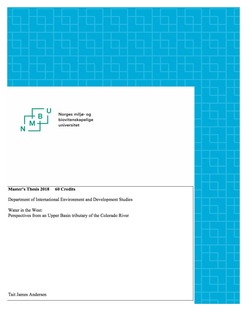| dc.contributor.advisor | Derman, William | |
| dc.contributor.author | Andersen, Tait James | |
| dc.coverage.spatial | USA | nb_NO |
| dc.date.accessioned | 2018-06-26T12:04:02Z | |
| dc.date.available | 2018-06-26T12:04:02Z | |
| dc.date.issued | 2018 | |
| dc.identifier.uri | http://hdl.handle.net/11250/2503027 | |
| dc.description.abstract | This thesis explores two institutional frameworks utilized in the governance of water in the Southwest of the United States through how they deliver, or fail to deliver, complex equity. These are (1) the legal framework and (2) cooperative agreements. This is done through a case study in the Roaring Fork River watershed, a major Upper Basin tributary to the Colorado River, by evaluating how stakeholders and different values of water are recognized and included in decision-making arenas. Stakeholders in the watershed can be positioned into three main groups: (1) agriculturalists, (2) municipalities and (3) environmentalists and recreationalists. I argue that neither institutional framework currently delivers complex equity and that achieving such equity will require changes in the legal framework because cooperative agreements do not tackle the core issues of property rights and compensation and thus, cannot effectively operate outside the legal framework. | nb_NO |
| dc.language.iso | eng | nb_NO |
| dc.publisher | Norwegian University of Life Sciences, Ås | nb_NO |
| dc.rights | Attribution-NonCommercial-NoDerivatives 4.0 Internasjonal | * |
| dc.rights.uri | http://creativecommons.org/licenses/by-nc-nd/4.0/deed.no | * |
| dc.subject | Water Governance | nb_NO |
| dc.title | Water in the West : perspectives from an Upper Basin tributary of the Colorado River | nb_NO |
| dc.type | Master thesis | nb_NO |
| dc.description.localcode | M-IES | nb_NO |

